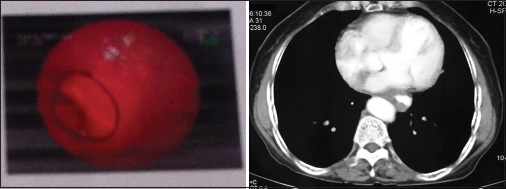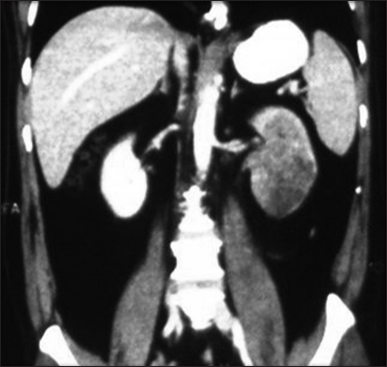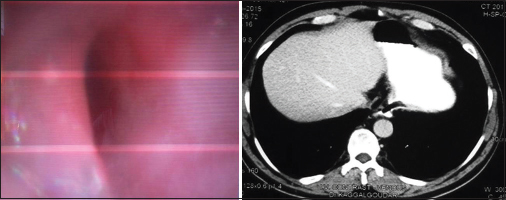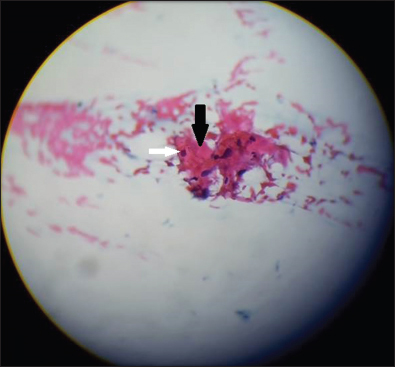Translate this page into:
Unilateral renal metastases after definitive chemoradiation in squamous cell carcinoma of esophagus: A case report and review literature
Address for correspondence: Dr. Kapil Dev, 307, PG Men's Hostel, Kidwai Memorial Institute of Oncology, Dr. M H Marigowda Road, Bengaluru, Karnataka, India. dr.kapil2010@gmail.com
This article was originally published by Thieme Medical and Scientific Publishers Private Ltd. and was migrated to Scientific Scholar after the change of Publisher.
Abstract
Kidney is considered to be the fifth most common site of metastases of esophageal carcinoma. Most of the metastatic renal tumors are bilateral, but a unilateral renal metastasis is extremely rare. There are only ten cases of unilateral renal metastases after curative treatment reported in literature. Herein is reported, a case of solitary, unilateral renal metastasis in a case of carcinoma esophagus after definitive chemoradiation treatment.
Keywords
Carcinoma esophagus
definitive chemoradiation
squamous cell carcinoma
unilateral renal metastases
Introduction
Esophageal carcinoma remains a highly lethal disease as evidenced by case fatality rate of more than 90% even after significant advancement in its diagnosis and treatment. The common cause of mortality is recurrence or metastasis, with a 5 year survival rate of 16% in 2009 in the United States.1 The common sites of visceral metastases in carcinoma esophagus other than regional lymph nodes are the liver, lungs, bones, and adrenal glands.2 Kidney is considered to be the fifth most common site of metastases of esophageal carcinoma. Most of the metastatic renal tumors are bilateral, but a unilateral renal metastasis is extremely rare.3 Herein is reported, a case of solitary, unilateral renal metastasis in a case of carcinoma esophagus after definitive chemoradiation treatment.
Case Report
A 55-year-old male was diagnosed with stage III squamous cell carcinoma (SCC) of the lower esophagus in 2012. He was treated with cisplatin with 5-fluorouracil based definitive concurrent chemo-radiotherapy (CCRT). He received external beam radiotherapy five days in a week for 5 weeks along with Cisplatin plus 5-fluoruracil on day1-5 in first and fifth week, followed by 4 cycles of same chemotherapy three weekly Figure 1. There was complete response with CCRT as evidenced by cross-sectional imaging and upper gastrointestinal (GI) endoscopy and he was on regular follow-up. In February 2015, he presented with two episodes of hematuria within a period of 2 weeks. He was a nonsmoker, nonalcoholic, and with no tobacco habits. Contrast-enhanced computed tomography of the abdomen and chest showed an ill-defined mild enhancing soft tissue mass of size 6.8 cm × 5.6 cm × 5 cm at the lower pole of the left kidney with few left para-aortic lymph nodes Figure 2. There was no thickening of esophagus Figure 3. Upper GI endoscopy showed no evidence of growth in esophagus Figure 3. Bone scintigraphy was normal. The ultrasonography-guided fine needle aspiration cytology showed metastatic SCC with a previously proven case of SCC esophagus Figure 4. In view of the metastatic disease, the patient was referred for palliative chemotherapy.

- Endoscopy showing proliferative growth in distal esophagus and contrast-enhanced computed tomography showing thickening of distal esophagus

- Contrast-enhanced computed tomography showing an ill-defined heterogenous enhancement (40–60 HU) lesion involving most of the left kidney with sparing upper pole and lateral cortex

- Posttreatment endoscopy showing no residual lesion and posttreatment no residual or recurrent lesion in esophagus

- Fine needle aspiration cytology showing squamous cell with large nucleus (white arrow) with keratinization (black arrow)
Discussion
Carcinoma esophagus is the eighth most common cancer with sixth leading cause of cancer mortality in the world as per the World Cancer Research Fund International. As per Indian cancer registry, it is the third most common cancer in South India. The usual risk factors of SCC esophagus are alcohol, tobacco, low socioeconomic status, etc., but in this patient, there were no high-risk elements. Although distant failure is more common in adenocarcinoma, SCC has higher incidence among metastatic renal tumors from esophageal carcinoma. Definitive CCRT is one of the accepted modalities of treatment of localized or locally advanced SCC of esophagus.4 Despite the increase in definitive treatment for esophageal carcinomas, about 43–63% of patients eventually experience a recurrence in the disease. Based on the contribution in local control of disease by definitive chemoradiation, the site of recurrence has shifted from local to remote. In review literature published by Geh et al., it was reported that patients who achieved pathological complete response were having 20% as overall risk of relapse, mostly due to distant metastasis.4
The common sites of metastases in lower esophagus carcinoma are the liver, lungs, bones, and adrenal glands after lymph node metastases. Other rare sites reported including brain, pericardium, skin, spleen, stomach, pancreas, and kidney.2
Carcinoma esophagus accounts only 4.8% of metastatic renal tumors.5 Fifty percentage of the renal metastases from esophagus had bilateral involvement.3 There are only ten cases of unilateral renal metastases, after curative treatment, reported in literature and most of them are from Japan. Diagnosis is very difficult due to ignorance of such rare metastases and the disease being asymptomatic despite extensive renal involvement.5,6,7 They may present with hematuria or flank pain, but mostly present as incidentaloma on follow-up imaging.
Metastatic renal tumors are smaller in size, less exophytic, wedge-shaped, and are frequently observed in sub-capsular location due to high vascularity of renal cortex. They tend to be of relatively high attenuation with minimal contrast enhancement (20–40 HU).8
The cytokeratins (CK 7 and 20) are expressed in urothelial carcinomas as well as in pancreatic carcinomas, cholangiocarcinomas, and ovarian mucinous carcinomas.9 Therefore, negative CK 7 and 20 can be used to distinguish metastatic renal SCC.
Unfortunately, the treatment of solitary renal metastases of esophageal carcinoma is still controversial with either nephrectomy or palliative chemotherapy due to rarity of such cases. Nephrectomy could be considered in case of uncertainty of histological diagnosis or severe life-threatening hematuria, which cannot be controlled by embolization.3 The median survival following the detection of a recurrent or metastatic esophageal carcinoma is 2–10 months.10
However, a unilateral renal metastasis after complete response to definitive chemoradiation of lower esophageal carcinoma is reported. In the case of renal mass with a history of malignancy, it should be considered as metastases until unless proven pathologically.
Financial support and sponsorship
Nil.
Acknowledgment
We thank Dr. Ashok for his help in preparation of this paper and for the photographs.
Conflicts of interest
There are no conflicts of interest.
References
- Incidence and distribution of distant metastases from newly diagnosed esophageal carcinoma. Cancer. 1995;76:1120-5.
- [Google Scholar]
- Esophageal squamous cell carcinoma recurring as a solitary renal mass. Cancer Res Treat. 2004;36:271-4.
- [Google Scholar]
- Preoperative (neoadjuvant) chemoradiotherapy in oesophageal cancer. Br J Surg. 2001;88:338-56.
- [Google Scholar]
- Metastatic renal tumor originating from esophageal cancer: Report of 2 cases. Hinyokika Kiyo. 1997;43:347-50.
- [Google Scholar]
- An esophageal cancer with a renal metastasis that was detected and resected as the only focus of recurrence. Gan No Rinsho. 1990;36:2047-52.
- [Google Scholar]
- Coordinate expression of cytokeratins 7 and 20 in prostate adenocarcinoma and bladder urothelial carcinoma. Am J Clin Pathol. 2000;113:383-8.
- [Google Scholar]
- Factors predictive of complete resection of operable esophageal cancer: Review of 746 patients. Gastroenterol Clin Biol. 2002;26:454-62.
- [Google Scholar]







